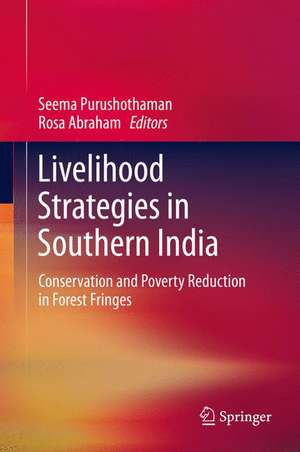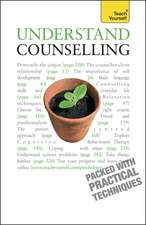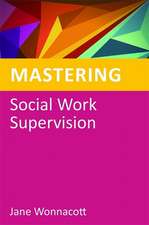Livelihood Strategies in Southern India: Conservation and Poverty Reduction in Forest Fringes
Editat de Seema Purushothaman, Rosa Abrahamen Limba Engleză Hardback – 17 dec 2013
| Toate formatele și edițiile | Preț | Express |
|---|---|---|
| Paperback (1) | 637.13 lei 6-8 săpt. | |
| Springer India – 17 sep 2016 | 637.13 lei 6-8 săpt. | |
| Hardback (1) | 643.34 lei 6-8 săpt. | |
| Springer India – 17 dec 2013 | 643.34 lei 6-8 săpt. |
Preț: 643.34 lei
Preț vechi: 756.86 lei
-15% Nou
Puncte Express: 965
Preț estimativ în valută:
123.10€ • 128.53$ • 101.88£
123.10€ • 128.53$ • 101.88£
Carte tipărită la comandă
Livrare economică 04-18 aprilie
Preluare comenzi: 021 569.72.76
Specificații
ISBN-13: 9788132216254
ISBN-10: 8132216253
Pagini: 200
Ilustrații: X, 217 p. 57 illus.
Dimensiuni: 155 x 235 x 20 mm
Greutate: 0.5 kg
Ediția:2013
Editura: Springer India
Colecția Springer
Locul publicării:New Delhi, India
ISBN-10: 8132216253
Pagini: 200
Ilustrații: X, 217 p. 57 illus.
Dimensiuni: 155 x 235 x 20 mm
Greutate: 0.5 kg
Ediția:2013
Editura: Springer India
Colecția Springer
Locul publicării:New Delhi, India
Public țintă
ResearchCuprins
Preface.- 1. Introduction Seema Purushothaman, Rosa Abraham.- 2. Adaptive Livelihood Strategies in the Karandhai malai forests, Tamil Nadu Kanmani Venkateswaran, Siddhartha Krishnan, Poosanavel Saravanan, M.C. Kiran and S.C. Gladwin Joseph.- 3. Livelihood Strategies of Peripheral Communities in Kanakapura, Karnataka Kavitha A., S.C. Gladwin Joseph, and Nitin D. Rai.- 4. Land Use Practices and Policies to Reduce Poverty – Lessons from Annaikatty in the Western Ghats.- Seema Purushothaman.- 5. Reconciling Conservation and Livelihoods with Fiscal Instruments – An Assessment of Bamboo in Karnataka Seema Purushothaman, Elisabeth Gsottbauer and Sheetal Patil.- 6. Reconciling Conservation and Livelihoods – The Role of Integrating Diverse Institutions Seema Purushothaman.- 7. Adaptive Livelihood Strategies – Community-Driven Ecotourism near Bangalore Seema Purushothaman, Benson Isac, Akai Mao and Priya Gupta.- 8. Reconciling Conservation and Livelihoods – The Role of SHGs in M.M. Hills, Karnataka Seema Purushothaman, Dhanya B. and Sheetal Patil.- 9. Village Commons, Livelihoods and Governance in Karnataka - An Assessment Sharachandra Lele, Seema Purushothaman and Sham Kashyap.
Notă biografică
Seema Purushothaman is Professor, Azim Premji University, Bengaluru, India. She was previously a Fellow of the Land, Water and Livelihoods Programme at the Ashoka Trust for Research in Ecology and the Environment (ATREE), Bengaluru.
Rosa Abraham is pursuing her PhD at the Institute for Social and Economic Change, Bengaluru, India. She was earlier with ATREE as a senior research associate.
Rosa Abraham is pursuing her PhD at the Institute for Social and Economic Change, Bengaluru, India. She was earlier with ATREE as a senior research associate.
Textul de pe ultima copertă
This volume is a compilation of essays that focus on livelihood issues faced by forest communities of the southern Western Ghats region of India. Communities living along the fringes of forests are, more often than not, overlooked in academic and policy discussions. However, they face considerable pressures, being sandwiched between conservation endeavours and the forces of urbanization and commercialization. The chapters in this book provide an insight into the kinds of livelihood issues these communities face and the potential means that can be adopted to sustain these livelihoods. This volume provides a unique alternative perspective by locating livelihood issues within socio-ecological-economic narratives of communities living at the intersection of the three southern Indian states of Karnataka, Kerala and Tamil Nadu, and suggests directions for policies to address these challenges.
Caracteristici
Focuses on forest communities in southern India, who have been largely ignored in the academic and policy arena Illustrates the application of a variety of assessment tools, from qualitative narratives to quantitative evaluations Provides direction to policies to address the multiple challenges faced by forest communities













